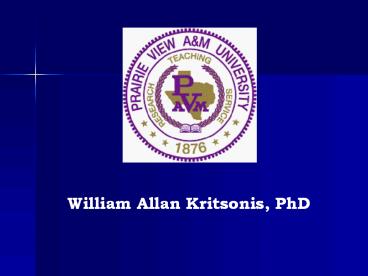William Kritsonis, School Law, Ch 5 Personnel Issues - PowerPoint PPT Presentation
Title:
William Kritsonis, School Law, Ch 5 Personnel Issues
Description:
William Kritsonis, School Law, Ch 5 Personnel Issues – PowerPoint PPT presentation
Number of Views:384
Title: William Kritsonis, School Law, Ch 5 Personnel Issues
1
William Allan Kritsonis, PhD
2
COLLECTIVE BARGIANINGDEFININTION
- Collective bargaining is defined as the
negotiation between an employer and a union to
determine the wages, hours and other terms of
employment for a group of employees with common
duties and interests and similar pay. The
collective bargaining agreement will be active
for a set period of time.
3
COLLECTIVE BARGAINING IN EDUCATION
- The major purpose of collective bargaining in
education is to develop and nurture those
educational leadership skills which are germane
to the understanding and application of
collective bargaining law. - The major thrusts are to provide the students
with a conceptual base from which they can exert
educational leadership, develop those technical
skills necessary to function effectively, and
identify and foster human skills associated with
successful contract development and management.
4
TEACHER UNIONS/COLLECTIVE BARGAINING
- Background in 1935 Congress passed the National
Labor Relation Act (Wagner Act) which guarantees
the right of private employees to form and join
unions to bargain collectively. - A wide range of provisions may be negotiated in
collective bargaining between teachers unions
and school districts. - The following are some of the matters that are
often the subject of bargaining academic
freedom, curriculum, wages and salaries,
training, hours, workload, and teaching
responsibilities, tenure, and probationary
period, promotion, reappointment personnel files
etc. - Constitutional Considerations the First
Amendment of the Bill Of Rights provides
Congress shall make no law prohibitingthe right
of people peaceably to assemble. This right, as
applied to the states through the Fourteenth
Amendment of the Constitution, has been
interpreted to give teachers and other employees
the right to free association, including the
right to join a union, such as the National
Education Association or the American Federation
of Teachers.
5
STATE AND LOCAL PROVISIONS GOVERNING COLLECTIVE
BARGAINING
- The National Labor Relations Act governs labor
relations in private schools, subject to some
limitations. A teachers union of a private
schools should determine whether the NRLA applies
to its school. State labor statues generally
govern labor relations between public school
districts and teachers unions. Collective
bargaining statues differ considerably from state
to state, with some states providing much more
guidance and specific rules than others.
6
Forming and Joining A Union To Bargain
Collectively
- Laws governing the representation process are
often quite complex. This process prefaces the
collective bargaining process and involves
numerous considerations, including types of
employees that will constitute a bargaining
unit, as well as the selection of an appropriate
union to represent teachers. In the public
school sector, state law affects both of these
determinations. Some states exclude certain
employees from a bargaining unit, including
supervisors and individuals in management
positions.
7
BARGAINING UNITS
- Teachers seeking to join for collective
bargaining must define an appropriate bargaining
unit. Under most labor relations statues, only
those individuals who share a community of
interests may compromise an appropriate
bargaining unit. Community of interests
generally means that the teachers have
substantial mutual interests, including the
following - Wages or compensation
- Hours of Work
- Employment benefits
- Supervision
- Qualifications Training and skills
- Job functions
- Contract with other employees
- Integration of work functions with other
employees - History of collective bargaining
8
ILLINOIS EDUCATIONAL LABOR ACT
- The Illinois Educational Labor Act is an act to
establish the right of educational employees to
organize and bargain collectively to define and
resolve unfair practice disputes and to establish
the Illinois Educational Labor Relations Board to
administer the Act.
9
ILLINOIS SCHOOL DISTRICT BUDGET PROCESS
- Collective bargaining is one of the most complex
areas of school administration. Successful
experiences in this endeavor involve the ability
to timely orchestrate a myriad of special skills
and knowledge. School law, labor law, personal
administration, human relations, labor relations,
school finance, community pressures,
communication skills, and common sense is
included in this myriad. Access to timely and
accurate information is also vital to
successfully completing negotiations. They also
publish a annual IASA publication to assist in
the collection of key salary and general contract
data that can be used in collective bargaining
planning and decision making.
10
COLLECTIVE BARGAINING TIGHTROPE
- The collective bargaining process between a board
of education and a teachers union can have
wide-ranging effects, not only for board members
and teachers but also for the community. The
superintendent, often caught in the middle, must
put politics aside and focus on doing whats
right for the students.
11
ILLINOIS PROVISIONS GOVERNING COLLECTIVE
BARGAINING
- Illinois Educational employees at all levels
permitted to bargain under the Illinois
Educational Labor Relations Act. However,
several types of employees, including
supervisors, managers, confidential employees,
short-term employees, and students, are excluded
from bargaining by statue. Impasse procedures
include mediation and fact-finding. Arbitration
is permitted. Strikes are permitted after
several conditions set forth in the statue are
met.































